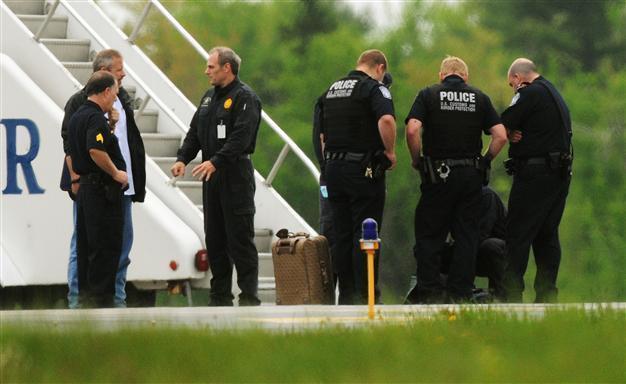'Human bomb' claim triggers France-US flight diversion
WASHINGTON - Agence France-Presse

Law enforcement officials stand near a jet bridge next to a passenger jet on the tarmac at Bangor International Airport, in Bangor, Me., Tuesday, May 22, 2012. AP photo
A French woman forced a US-bound transatlantic flight to be diverted after claiming she was carrying a "surgically implanted device," US officials said.The US Airways plane, flying from Paris, was diverted to Maine on Tuesday where the woman was taken into custody by the FBI before the Boeing 767 continued its journey to Charlotte, North Carolina.
Coming on the heels of a thwarted airline bomb plot by Al-Qaeda's Yemen branch, the incident has laid bare US worry over shifting tactics of extremists as they seek new ways -- and new technologies, including non-metallic bombs -- for landing a deadly blow against an American target.
Last year, US officials warned airlines that terror groups were studying how to surgically hide bombs inside humans to evade airport security -- precisely the threat that emerged when the US Airways passenger made herself known to the cabin crew.
Senator Susan Collins, the ranking Republican on the Senate Homeland Security Committee, highlighted the concerns shortly after news broke of Flight 787's diversion to Maine, saying there has been "intelligence identifying surgically implanted bombs as a threat to air travel." Collins, briefed on the incident by Transportation Security Administration chief John Pistole, said TSA recently issued security directives to airports, airlines, and foreign governments, "advising them to take added screening precautions and to be on the lookout for indicators of surgically implanted explosives." The US Airways flight took off without incident from Paris' Charles de Gaulle airport bound for Charlotte with 179 passengers and crew.
At some point during the flight, a passenger "handed a note to a flight attendant that said she had a surgically implanted device inside her," House Homeland Security Committee Chairman Peter King said in a statement.
The Cameroon-born woman was traveling alone with no checked baggage and visiting the United States for 10 days, according to King.
Alarmed crew on board isolated the passenger, and "doctors on the flight checked her out and did not see any sign of recent scars," King added.
A police source in Paris said that the woman was unknown to French intelligence.
"This woman is completely unknown to French police and intelligence in particular," the source told AFP, requesting anonymity. "She appears to be psychologically disturbed." Andrew Kobayashi, a passenger on the flight, told CNN that the woman, who appeared to be in her mid-20s to mid-30s, was sweating and acting nervous.
"I had briefly noticed her in the back of the plane being a weirdo... (She) seemed on edge, but no more so than anybody who is nervous about flying," said Kobayashi, who was seated several rows forward of the woman.
Concerned pilots radioed in to North American Aerospace Defense Command, and two F-15 fighter jets based in Massachusetts were scrambled to escort the airliner through its tension-filled descent to Bangor, Maine.
An FBI joint terrorism task force, accompanied by a bomb squad, local police and other security agencies then met the aircraft upon arrival.
"FBI agents and members of a joint terrorism task force interviewed the passenger and others on the plane," FBI spokesman Greg Comcowich said.
"At this time, there is no indication the plane or its passengers were ever in any actual danger." A US official told AFP that the suspect was unlikely to be part of a broader international terror plot linked to groups such as Al-Qaeda.
"It doesn't appear to be any terrorist nexus at this point," said the official.
But it served as a blunt reminder of the ongoing efforts by groups like Al-Qaeda in the Arabian Peninsula (AQAP) to eventually break through tight US security with a functional bomb.
And it came after news emerged earlier this month of a foiled plot to blow up a US-bound airliner.
US officials said the plot involved a non-metallic device, intended for use by a suicide bomber on an airliner, that was an updated version of the "underwear bomb" used in a failed attack on a US-bound flight on Christmas Day 2009.
Though officials touted the disrupted plot as a success, they acknowledged AQAP remained determined to strike and its master bombmaker, Ibrahim Al-Asiri, was apparently hard at work seeking to circumvent airport security.
Washington says Asiri is the prime suspect behind an attempt by the lethal Al-Qaeda offshoot to send parcel bombs from Yemen to the United States in October 2010.
The packages, addressed to synagogues in Chicago and containing the hard-to-detect explosive PETN hidden in printer ink cartridges, were discovered en route in Britain and Dubai.
















